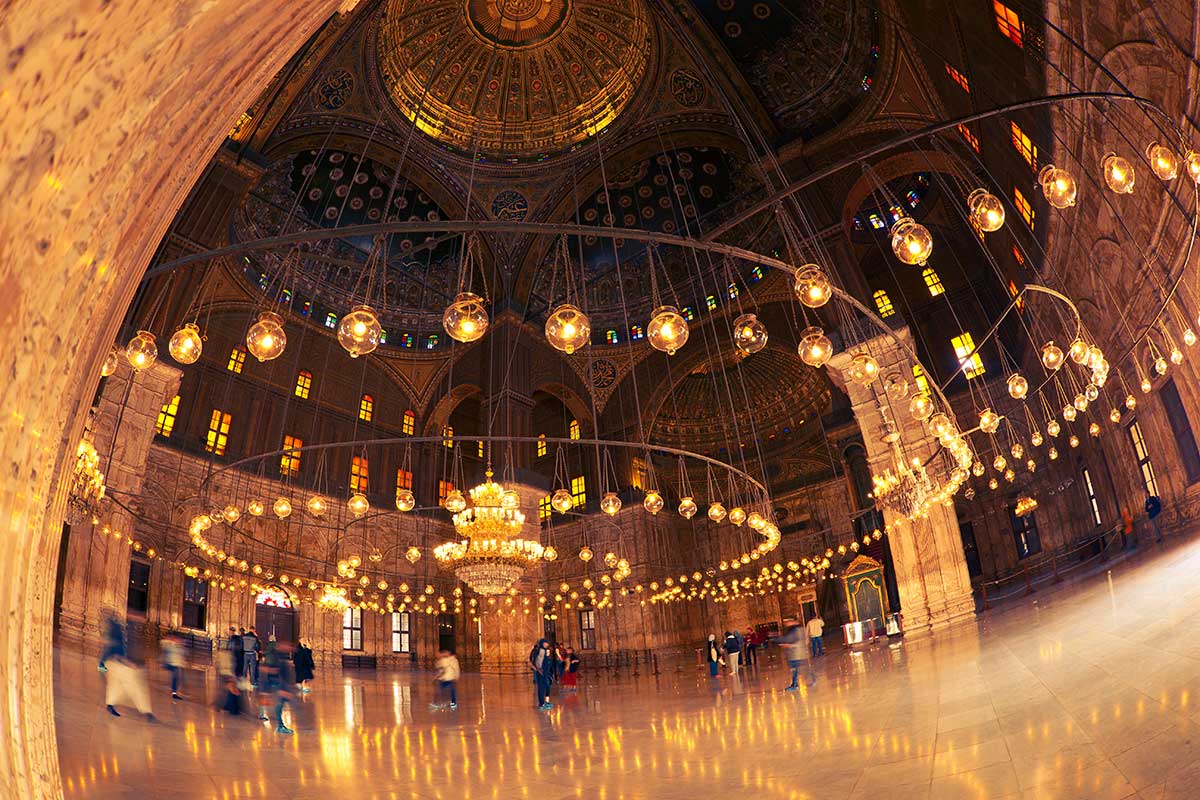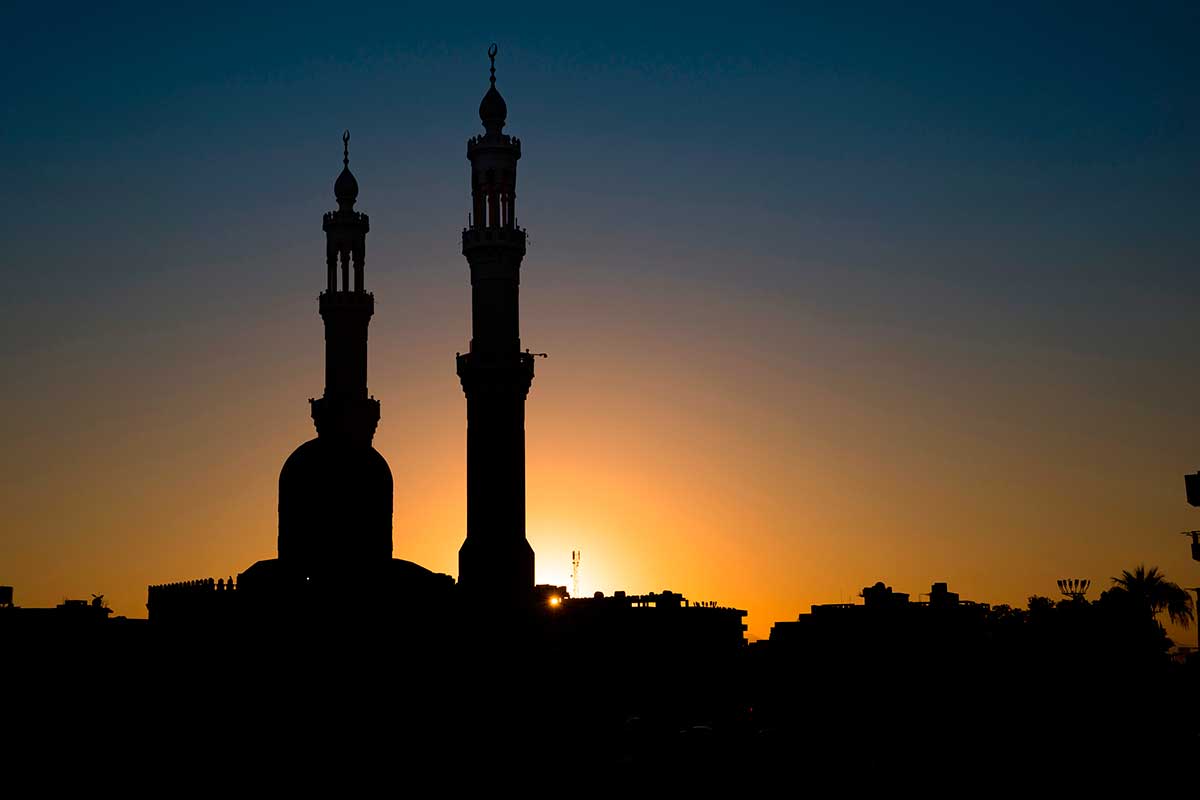Islam is not just the predominant religion in Egypt, but it also has a profound impact on the country’s social life, legal system, and politics. To fully appreciate your trip to Egypt, it’s crucial to understand how this religion works and how it is practiced in the country. In this article, we will provide you with some key facts to help you navigate your journey. If you’re interested in learning more about Islam in Egypt, our agency can also design a program that incorporates religious aspects, as it is an essential part of the country’s cultural identity.
Islam is an integral part of Egyptian society, and the following figures help illustrate its importance and relevance:
Due to its proximity to sacred and foundational sites of Islam, such as Mecca or Jerusalem, Egypt was among the first countries to be conquered by Muslim troops during their earliest moments of expansion. Muhammad was born in Mecca in 570, initiated the Hijra in 622 (the moment when the Islamic calendar begins), and died in Medina in 632.
Afterward, there was a rapid expansion of the Muslim faith throughout the Middle East, resulting in the introduction of Islam in Egypt between 639 and 642. At that time, Egypt remained under the political rule of the Byzantine Empire and under the faith of Coptic Christianity at the religious level, although it was embroiled in deep doctrinal controversies and coexisting with other beliefs.
For geographical reasons, the Sinai Peninsula was the first area to be conquered by Arab armies composed, among other units, of 4,000 elite horsemen. In addition, numerous Bedouins from the desert were recruited. Cities fell one after another, and in fact, it was one of the fastest conquests in this phase of Muslim expansion: Pelusio, Belbeis, Heliopolis, Fayum, Thebaid…
The conquest of the Roman fortress of Babylon, strategically located between the Delta and the Nile Valley, was a significant victory that resulted in the emergence of military camps and administrative settlements, including Fustat and later Al Qahira, which eventually became the city of Cairo.
However, the most crucial battle was fought for the capital, Alexandria, which fell in 641, marking the collapse of Byzantine resistance.
In contrast, the southern region of Lower Nubia, where Christianity was deeply rooted, was a later and more difficult conquest for Islam due to both geographical and religious reasons. The area did not fully embrace Islam until the Middle Ages.
Since the arrival of Islam in Egypt, the country has remained under its influence. The new Muslim rulers did not impose the religion by force but established taxes for non-believers and gave preference to converts, which facilitated its status as the predominant religion in later centuries. Though the speed of its spread is contested, Islam had become the majority religion in Egypt by the 11th and 12th centuries.
The only significant threats to Muslim rule came from the Byzantine Empire’s unsuccessful attempts to restore Christianity and European armies during the Crusades. The latter sought to regain Jerusalem and other sacred sites for Christianity, with the conquest of Egypt being a necessary step towards that goal.

While there are very conservative currents of Islam in Egypt, such as the Muslim Brotherhood organization, there are also Egyptians who do not strictly follow Islamic precepts. According to data from Arabbarometer.org, the percentage of people who do not declare themselves religious has risen from almost 3% to over 10% in the last decade. However, this figure is still one of the lowest among its neighboring countries, and the majority of the population falls into a broad middle ground.
Egypt plays a central role in the international context as a moderate and slightly open country. The Al Azhar Mosque serves as a reference international teaching center, and its Grand Imam is one of the great spiritual leaders for Muslims in Egypt and beyond.
Egyptian Muslims, like those in any other country, govern their lives based on the five pillars of Islam:
One of the key aspects that you will notice during your trip to Egypt, whether you are Muslim or not, is the importance of prayer. The call to prayer, which is broadcasted by loudspeakers installed in the minarets of mosques, is a powerful reminder of this religious obligation. In particular, the Friday noon prayer time is significant, as it is mandatory to attend the mosque to pray in congregation, whereas the other prayer times can be done privately at home.
Ramadan is a significant pillar of Islam and is celebrated with great fervor in Egypt. If you’re fortunate enough to visit Egypt during this time, which varies annually based on the lunar calendar, it’s essential to pay special attention to it to respect it appropriately and avoid unintentionally causing offense.
During Ramadan, Muslims fast from dawn until sunset, refraining from eating and drinking. This slows down activity on the streets, and many people opt to sleep in or take extended naps, or close their businesses to conserve their energy as much as possible.
However, Ramadan is not a month of sadness and austerity. On the contrary, it’s a time of exceptional camaraderie and joy for Muslims in Egypt, especially during the breaking of the fast (iftar) after sunset. In some instances, large communal dinners are organized where everything is provided, while in others, public events and performances are scheduled at night, which can last until the early morning. As a result, several tourists select Ramadan as a genuine cultural experience rather than avoiding it during their travels.
If your visit coincides with Ramadan, and you’re not Muslim, you’re not required to fast, but you should demonstrate extra consideration for others. In particular, you should refrain from eating or drinking in their presence, as it is considered a significant sign of disrespect. On the other hand, greeting Muslims you encounter during your travels with “Happy Ramadan” (Ramadan mubarak) is a straightforward gesture that they will undoubtedly appreciate.
If you travel with our agency during Ramadan, we will provide you with guidelines and practical advice to help you navigate this exceptional period for Islam in Egypt.
Islam, like other major religions, has different branches based on different interpretations of its teachings and practices. In Egypt, the two main branches of Islam are Sunni and Shia, although they are present in unequal proportions.
The vast majority of Muslims in Egypt, about 90% of the country’s 90 million Muslims, are Sunni. Sunni Islam is also the majority sect throughout the Muslim world, comprising over 85% of its followers.
Sunnis believe in the Sunnah, a collection of traditional teachings attributed to Prophet Muhammad, which they consider a source of divine revelations from Allah, just like the Quran.
Egypt’s capital, Cairo, is home to one of the most important Sunni mosques and centers of learning in the world – the Al Azhar Mosque. Many other Sunni mosques of great historical, architectural, and religious significance can also be found throughout the country.
In contrast, Shiites make up less than 10% of the Muslim population in Egypt, although this figure varies widely from one source to another, possibly due to some followers of the sect not openly acknowledging their affiliation due to persecution or displacement.
The primary differences between Shiites and Sunnis are two-fold. Firstly, Shiites tend to have more flexible interpretations of sacred texts, and secondly, they are followers of Ali, the caliph and son-in-law of Muhammad through his marriage to Fatima, the prophet’s daughter. Ali was assassinated in 661 and his sons, Hasan and Hussein, were not recognized as his rightful successors.
Despite being a minority among Muslims in Egypt, Shiites have one of their most sacred mosques in Cairo – the Al-Hussein mosque – which contains the remains of Hussein, the aforementioned son of Ali and Fatima, and therefore the grandson of the Prophet Muhammad. Despite the rivalry between the two sects, Sunnis hold great respect for this temple, among other reasons, due to the historical significance of the Fatimid dynasty, which reigned successfully in the country for a couple of centuries (10th-12th centuries) and declared itself the heir of Fatima, and therefore Shiite.

Taking a closer look at the main mosques of Egypt is not only interesting for their grandeur but also for the immense symbolism they hold for followers of Islam in Egypt and beyond. Here is a list of the most important ones, which you can explore in more detail on the pages dedicated to their respective cities:
Fill out the form below to receive a free, no-obligation, tailor-made quote from an agency specialized in Egypt.
Travel agency and DMC specializing in private and tailor-made trips to Egypt.
Mandala Tours, S.L, NIF: B51037471
License: C.I.AN-187782-3